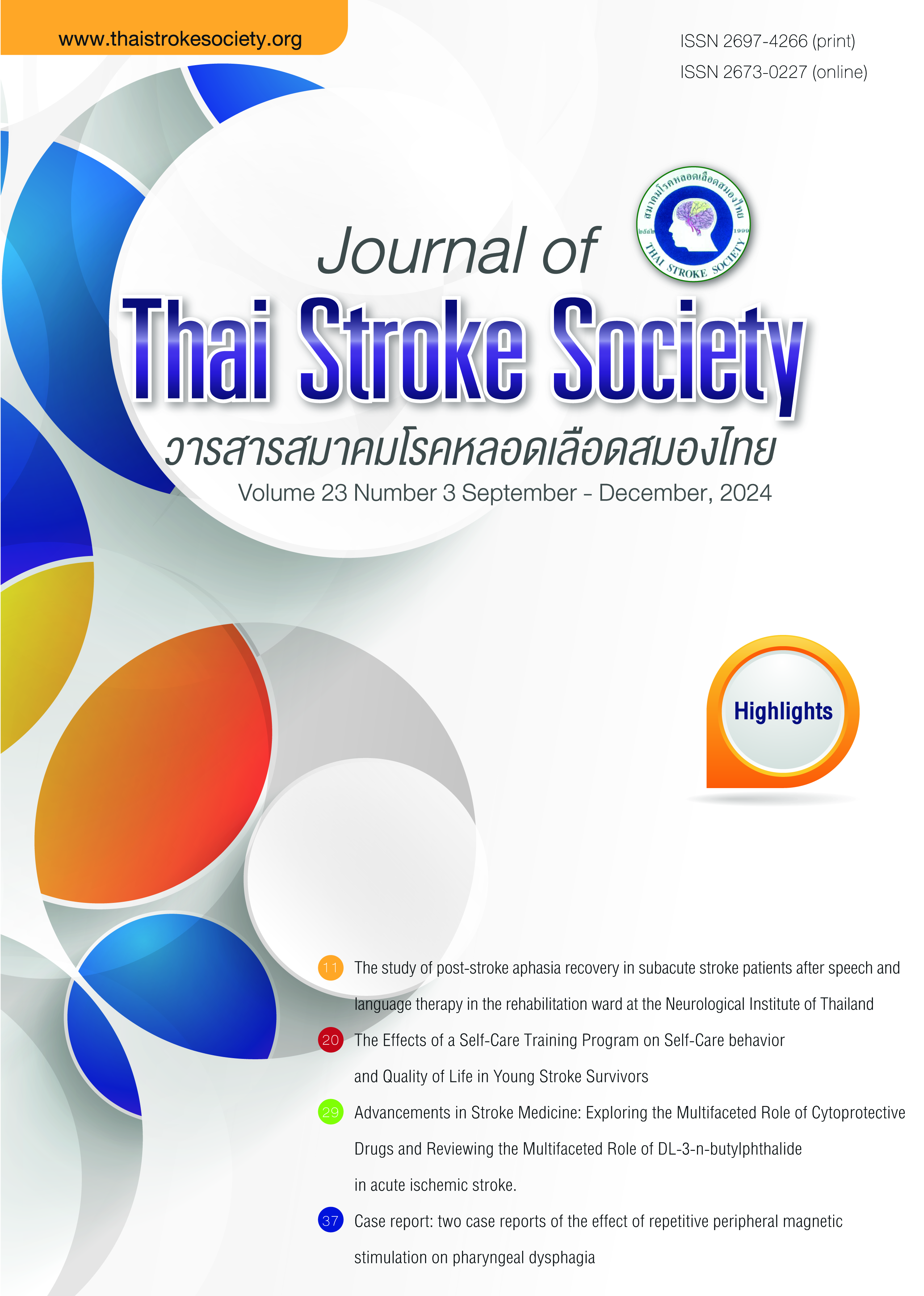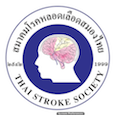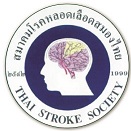Case report: two case reports of the effect of repetitive peripheral magnetic stimulation on pharyngeal dysphagia
Keywords:
repetitive Peripheral Magnetic Stimulation (rPMS), Pharyngeal dysphagia, poststroke dysphagiaAbstract
Dysphagia is a common sequela after a stroke, significantly impacting the overall recovery outcome. Complications associated with poststroke dysphagia, such as aspiration pneumonia, dehydration, malnutrition, and, in some cases, death, highlight the importance of screening and proper management as essential tools. This study aims to evaluate the effectiveness of repetitive Peripheral Magnetic Stimulation (rPMS) intervention in the pharyngeal dysphagia stage. Two cases of poststroke dysphagia were recruited for treatment, with a frequency of 20 Hz and 35% intensity, for a total of 1,200 pulses per session twice per week and a total of 16 sessions. Changes in the Eating Assessment Tool-10 (EAT-10) score and the Functional Oral Intake Scale (FOIS) level were recorded, showing improvement in both parameters. As a result, the patients could remove the nasogastric (NG) tube and resume an oral diet with the assistance of swallowing maneuvers. The findings suggest that rPMS may be beneficial for addressing pharyngeal stage dysphagia.
References
Cohen DL, Roffe C, Beavan J, Blackett B, Fairfield CA, Hamdy S, et al. Post-stroke dysphagia: A review and design considerations for future trials. International Journal of Stroke 2016;11(4):399-411.
Virvidaki LE, Nasios G, Kosmidou M, Giannopoulos S, Milionisa H. Swallowing and Aspiration Risk: A Critical Review of Non-Instrumental Bedside Screening Tests. J Clin Neurol 2018;14(3):265–74.
Kim JW, Choi H, Jung J, Kim JH. Risk factors for aspiration pneumonia in patients with dysphagia undergoing videofluoroscopic swallowing studies. Medicine (Baltimore) 2020;99(46):1-7.
Jongprasitkul H, Kitisomprayoonkul W. Effectiveness of Conventional Swallowing Therapy in Acute Stroke Patients with Dysphagia [Internet]. Rehabilitation Research and Practice; 2020 [cited 2023 Jul 20]. Available from: https://www.ncbi.nlm.nih.gov/pmc/articles/PMC7556095/
Virvidaki LE, Nasios G, Kosmidou M, Giannopoulos S, Milionisa H. Swallowing and Aspiration Risk: A Critical Review of Non-Instrumental Bedside Screening Tests. J Clin Neurol 2018;14(3):265–74.
Puprasert C. Applications of Transcranial Magnetic Stimulation in Post-Stroke Dysphagia. ASEAN J Rehabil Med 2021;31(1):2-8.
J-W Park, J-C Oh, J-W Lee, J-S Yeo, K H Ryu. The effect of 5Hz high-frequency rTMS over contralesional pharyngeal motor cortex in post-stroke oropharyngeal dysphagia: a randomized controlled study. Neurogastroenterol Motil 2013 Apr; 25(4):324-e250. PMID: 23279198.
Techataweesub S, Khobkhun F. The effects of Peripheral Magnetic Stimulation on Improving Impairment and Functional Activity in Individuals with Stroke. J Thai Stroke Soc 2022;21(1):58-70.
Mori S, Kagaya H, Nagashima Y, Toda F, Kuwabara A, Masuda Y. Feasibility of repetitive peripheral magnetic stimulation for dysphagia with reduced hyoid elevation: a report of two cases. Jpn J Compr Rehabil Sci 2019;10;42-6.
Momosaki R, Abo M, Watanabe S, Kakuda W, Yamada N, Kinoshita S. Repetitive Magnetic Stimulation with intensive swallowing rehabilitation for Poststroke Dysphagia: An Open-Label Case Series. Neuromodulation 2015;18:630-35.
Fawaz S.I., Izumi S.I., Zaki A.S., Eldiasty S.E., Saadawy A, Saber H.G.,et al. Repetitive peripheral magnetic stimulation for improving upper limb function in post-stroke hemiparesis [Internet]. Egypt Rheumatol Rehabilitation; 2023 [cited 2024 Apr 20]. Available from: https://erar.springeropen.com/articles/10.1186/s43166-023-00204-x.
Philipp B, Sydney C, Richard Z, Georg K. Post-stroke Dysphagia: Prognosis and Treatment–A Systematic Review of RCT on Interventional Treatments for Dysphagia Following Subacute Stroke: SYSTEMATIC REVIEW article. Frontiers in Neurology 2022;13:1-9.
Marlís G, Lauren O, Levan A, Asare B. C. Dysphagia after Stroke: an Overview. Curr Phys Med Rehabil Rep 2013;1(3):187–96.
Downloads
Published
How to Cite
Issue
Section
License
Copyright (c) 2024 Journal of Thai Stroke Society

This work is licensed under a Creative Commons Attribution-NonCommercial-NoDerivatives 4.0 International License.
ข้อความภายในบทความที่ตีพิมพ์ในวารสารสมาคมโรคหลอดเลือดสมองไทยเล่มนี้ ตลอดจนความรับผิดชอบด้านเนื้อหาและการตรวจร่างบทความเป็นของผู้นิพนธ์ ไม่เกี่ยวข้องกับกองบรรณาธิการแต่อย่างใด การนำเนื้อหา ข้อความหรือข้อคิดเห็นของบทความไปเผยแพร่ ต้องได้รับอนุญาตจากกองบรรณาธิการอย่างเป็นลายลักษณ์อักษร ผลงานที่ได้รับการตีพิมพ์ในวารสารเล่มนี้ถือเป็นลิขสิทธิ์ของวารสาร





